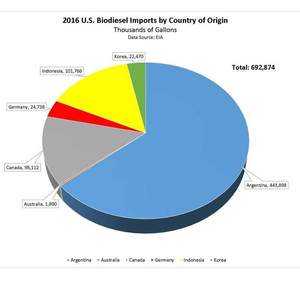Antidumping ruling places more duties on US biodiesel imports

Image: EIA data graphically compiled by Ron Kotrba, Biodiesel Magazine
October 25, 2017
BY The National Biodiesel Board
The National Biodiesel Board Fair Trade Coalition won a preliminary antidumping determination from the U.S. Department of Commerce regarding dumped biodiesel imports from Argentina and Indonesia. The commerce department found that biodiesel imports from Argentina and Indonesia are sold into the U.S. below fair value, and it imposed preliminary duties on imports from these countries based on the amount of dumping found.
“It is reassuring with each decision that the commerce department is reviewing the data and facts at face value,” said Doug Whitehead, chief operating officer for the NBB. “The law is clear, and violations of trade law shouldn’t be ignored at the expense of the livelihoods of thousands of Americans employed or affected by biodiesel.”
Advertisement
Advertisement
As a result of the commerce department’s ruling, importers of Argentinian and Indonesian biodiesel will be required to pay cash deposits on biodiesel imported from those countries. The cash deposit rates range from 54.36 to 70.05 percent for biodiesel from Argentina, and 50.71 percent for biodiesel from Indonesia, depending on the particular foreign producer or exporter involved. Cash deposit requirements will be imposed when this preliminary determination is published in the Federal Register sometime next week. The duty deposit requirements are in addition to the deposits required pursuant to the commerce department’s preliminary countervailing duty determination in August, which confirmed that biodiesel producers in Argentina and Indonesia have received massive subsidies.
The NBB Fair Trade Coalition filed these petitions to address a flood of subsidized and dumped imports from Argentina and Indonesia that has resulted in market share losses and depressed prices for domestic producers. Biodiesel imports from Argentina and Indonesia surged by 464 percent from 2014 to 2016, taking 18.3 percentage points of market share from U.S. manufacturers. Imports of biodiesel from Argentina again jumped 144.5 percent following the filing of the petitions. These surging, low-priced imports prevented producers from earning adequate returns on their substantial investments and caused U.S. producers to pull back on further investments to serve a growing market.
Between the preliminary and final antidumping determinations, the commerce department will audit the foreign producers to confirm the accuracy of their data submissions. Parties will file briefs on issues arising from the agency’s preliminary antidumping duty determinations, and the commerce department will hold a hearing, with a final antidumping determination due early next year. A final determination by the commerce department in the companion countervailing duty determination is due to be announced in early November, with a final determination by the U.S. International Trade Commission connection with the countervailing duty case expected in December.
Advertisement
Advertisement
Download the fact sheet from the commerce department here.
Made from an increasingly diverse mix of resources such as recycled cooking oil, soybean oil and animal fats, biodiesel is a renewable, clean-burning diesel replacement that can be used in existing diesel engines without modification. It is the nation’s first domestically produced, commercially available advanced biofuel. The NBB is the U.S. trade association representing the biodiesel and renewable diesel industries, including producers, feedstock suppliers and fuel distributors.
Related Stories
The U.S. EPA on July 8 hosted virtual public hearing to gather input on the agency’s recently released proposed rule to set 2026 and 2027 RFS RVOs. Members of the biofuel industry were among those to offer testimony during the event.
The USDA’s Risk Management Agency is implementing multiple changes to the Camelina pilot insurance program for the 2026 and succeeding crop years. The changes will expand coverage options and provide greater flexibility for producers.
President Trump on July 4 signed the “One Big Beautiful Bill Act.” The legislation extends and updates the 45Z credit and revives a tax credit benefiting small biodiesel producers but repeals several other bioenergy-related tax incentives.
CARB on June 27 announced amendments to the state’s LCFS regulations will take effect beginning on July 1. The amended regulations were approved by the agency in November 2024, but implementation was delayed due to regulatory clarity issues.
SAF Magazine and the Commercial Aviation Alternative Fuels Initiative announced the preliminary agenda for the North American SAF Conference and Expo, being held Sept. 22-24 at the Minneapolis Convention Center in Minneapolis, Minnesota.
Upcoming Events










